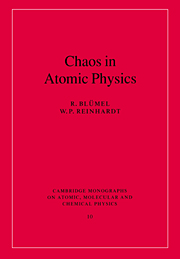Book contents
- Frontmatter
- Contents
- Preface
- 1 Introduction
- 2 Chaos: tools and concepts
- 3 Chaos in classical mechanics
- 4 Chaos in quantum mechanics
- 5 The kicked rotor: paradigm of chaos
- 6 Microwave-driven surface state electrons
- 7 The hydrogen atom in a strong microwave field
- 8 The kicked hydrogen atom
- 9 Chaotic scattering with CsI molecules
- 10 The helium atom
- 11 Chaos in atomic physics: state of the art and research directions
- References
- Index
2 - Chaos: tools and concepts
Published online by Cambridge University Press: 14 September 2009
- Frontmatter
- Contents
- Preface
- 1 Introduction
- 2 Chaos: tools and concepts
- 3 Chaos in classical mechanics
- 4 Chaos in quantum mechanics
- 5 The kicked rotor: paradigm of chaos
- 6 Microwave-driven surface state electrons
- 7 The hydrogen atom in a strong microwave field
- 8 The kicked hydrogen atom
- 9 Chaotic scattering with CsI molecules
- 10 The helium atom
- 11 Chaos in atomic physics: state of the art and research directions
- References
- Index
Summary
In Chapter 1 we discussed some concepts of chaos, its manifestations and applications on an introductory level from a purely qualitative point of view. The concepts were introduced ad hoc and in a pictorial manner. We will now turn to a more detailed investigation of chaos in order to prepare the tools and concepts needed for the discussion of chaotic atomic and molecular systems.
For a long time researchers thought that every given nonlinear system required its own individual method of solution. If this were the case, there could not be any general theory of nonlinear systems. Rather, the science of nonlinear systems would resemble descriptive sciences such as 19th century biology or geology. The best one could offer would be a catalogue of nonlinear systems together with their individual properties and methods of solution (if any). Luckily, the situation is much more promising. Not so long ago it was shown by Feigenbaum (1978, 1979) that there is universality in chaos. Universality is the key property of chaos. Universality means that all nonlinear (chaotic) systems can be analysed using a common set of methods and tools. Thus, a given nonlinear system does not require special treatment. It is always amenable to a general analysis, whose elements are discussed in the following sections.
It was Poincaré who introduced a major revolution in the analysis of dynamical systems in classical mechanics.
- Type
- Chapter
- Information
- Chaos in Atomic Physics , pp. 29 - 63Publisher: Cambridge University PressPrint publication year: 1997



